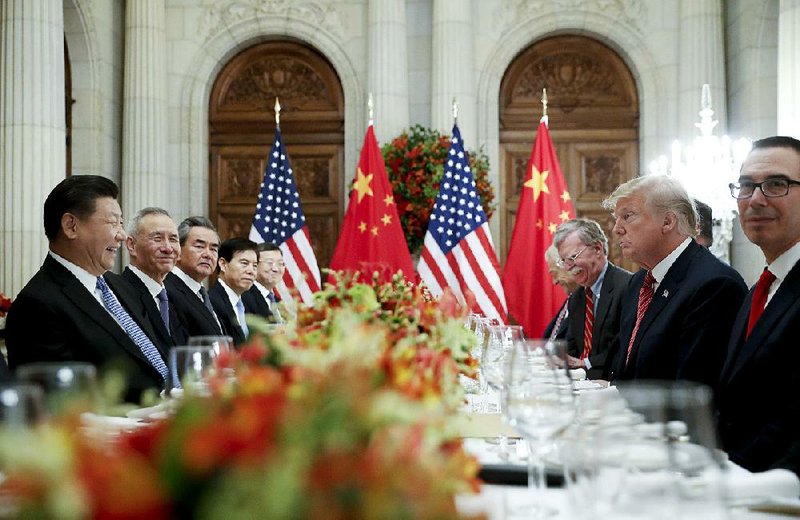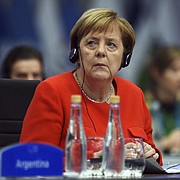BUENOS AIRES, Argentina -- The United States and China on Saturday reached a 90-day truce in a trade dispute that has rattled financial markets. The breakthrough came after a dinner meeting between President Donald Trump and Chinese leader Xi Jinping at the Group of 20 summit in Buenos Aires.
Also Saturday, leaders of the world's top economies agreed to repair the global trading system as they closed a summit that saw Trump's administration at odds with many allies over the Paris accord on climate change and issues like migration.
The joint statement signed by all 20 member nations said 19 of them reaffirmed their commitment to the Paris climate accord, with the United States, which withdrew from the pact under Trump, the lone holdout. The official communique acknowledged flaws in global commerce and called for overhauling the World Trade Organization.
In the truce with China, Trump agreed to hold off on plans to raise tariffs Jan. 1 on $200 billion in Chinese goods. The Chinese agreed to buy a "not yet agreed upon, but very substantial amount of agricultural, energy, industrial" and other products from the United States to reduce America's trade deficit with China, the White House said.
The agreement, reached after a dinner of more than two hours, buys time for the two countries to work out their differences in a dispute over China's aggressive drive to supplant U.S. technological dominance.
"It's an incredible deal," Trump told reporters aboard Air Force One. "What I'll be doing is holding back on tariffs. China will be opening up; China will be getting rid of tariffs. China will be buying massive amounts of products from us."
In another long-sought concession to the U.S., China agreed to label fentanyl, the deadly synthetic opioid responsible for tens of thousands of American drug deaths annually, as a controlled substance.
U.S. officials for years have been pressing the Chinese government to take a tougher stance against fentanyl, and most of the U.S. supply of the drug is manufactured in China.
White House press secretary Sarah Huckabee Sanders said China's decision to label the drug as a controlled substance means that "people selling Fentanyl to the United States will be subject to China's maximum penalty under the law."
G-20 STATEMENT
Earlier in the day, applause broke out in the convention center hall as the G-20 leaders, including Trump, signed off on the joint statement at the end of the two-day summit in the Argentine capital, the first time it had been held in South America.
The nonbinding agreement was reached after marathon talks by diplomats stretched overnight and into daylight, with deep divisions showing among member nations. European Union officials said the United States was the main holdout on nearly every issue.
But China also pushed back in talks on steel; South Africa objected to language on trade; Australia didn't want the statement to be too soft on migration; and Turkey worried it would push too far on climate change, according to the officials.
The final language of the statement says, regarding climate, that 19 nations that are signatories to the Paris accord reiterate their commitment to it while the U.S. reiterates its decision to withdraw. It also notes a recent U.N. report that warned damage from global warming will be much worse than previously feared, and expresses support for an upcoming U.N. climate meeting in Poland meant to nail down how countries will meet promises made in the Paris accord.
According to a senior White House official, the unusual language on climate was necessary for Washington to sign on, and Turkey, Saudi Arabia and Russia had appeared sympathetic to the U.S. position but ultimately stayed with the other countries.
On global commerce, the statement says the 20 countries support multilateral trade but acknowledge that the current system doesn't work and needs fixing, via "the necessary reform of the WTO to improve its functioning."
The statement did not include a reference to the dangers of protectionism, which U.S. officials said could have held it up.
On migration, European officials said the U.S. negotiator said too much talk about it would have been a "deal-breaker" for Trump. So they came up with "minimalist" language that acknowledges growing migrant flows and the importance of shared efforts to support refugees and solve the problems that drive them to flee.
The statement also shows a commitment to a "rules-based international order," despite Trump's rejection of many of those rules.
French President Emmanuel Macron called it a victory that the U.S. signed on to the statement at all, given the tensions going into the talks. "With Trump, we reached an agreement," Macron said. "The U.S. accepted a text."
Thomas Bernes of the Canada-based Center for International Governance Innovation, who has held leading roles with the International Monetary Fund, the World Bank and the Canadian government, said the G-20 had "veered all over the road" at the summit and failed to truly fix trade. The U.S. was out of step on migration and climate change and blocked meaningful agreement on those issues, he added.
Perhaps surprisingly, one country that was seen as particularly constructive was Russia, the EU officials said. Despite tensions over its military actions on Ukraine and political interference abroad, Russia supports international efforts on trade and climate.
Summits like this "don't take away contradictions" among G-20 leaders, Russian President Vladimir Putin said. But he added that "these meetings are useful because countries that are fighting" can focus on problems they all agree on such as WTO reform.
The summit statement's language on climate was welcomed by environmental groups such as the World Wildlife Fund and Greenpeace, the latter of which said in a statement: "The necessity of the U.S. being part of the effort to fight climate change cannot be denied, but this is a demonstration that the U.S. is still the odd one out."
While a statement isn't legally enforceable, the Europeans see it as proof that the G-20 is still relevant and that multilateralism still works.
"Everyone agrees that the WTO should be reformed," German Chancellor Angela Merkel said. "This is an important agreement."
"We will send a clear signal -- in any case, most of us" -- for the success of global climate talks starting in Poland today, Merkel added.
In closing remarks, the summit's host, Argentine President Mauricio Macri, said the countries had overcome "a number of challenges" to reach the statement.
The next G-20 summit is to be held in Osaka, Japan, in June.
CANCELED MEETINGS
The Trump-Xi meeting was the marquee event of Trump's two-day trip to Argentina for the summit after the president canceled a sit-down with Putin over mounting tensions between Russia and Ukraine.
Trump also skipped a meeting with Crown Prince Mohammed bin Salman of Saudi Arabia. The CIA has concluded the crown prince played a role in the killing of Saudi dissident Jamal Khashoggi in the Saudi Consulate in Istanbul in October.
Macron and British Prime Minister Theresa May both said they had pressed Prince Mohammed for international involvement in investigating the slaying.
May said she spoke to the crown prince about the importance of "a full, credible, transparent investigation that identifies those who are involved and that ensures that those involved are held to account." Macron did similar, but said Prince Mohammad only "took note" of his demands and expressed hope the prince would respond soon.
Turkish President Recep Tayyip Erdogan lamented that the issue of Khashoggi's killing was not a part of the official agenda and said the only leader who brought it up was Canadian Prime Minister Justin Trudeau. According to Erdogan, the crown prince's response was that Saudi Arabia cannot be blamed unless the crime is proved, something the Turkish leader called "unbelievable."
Trump met Saturday with Erdogan, but the White House closed the session to even the brief picture-taking opportunity that usually accompanies such meetings.
In other developments, Trump announced aboard Air Force One on his return to Washington that his next meeting with North Korea's Kim Jong Un would likely happen in January or February. He said there were three sites under consideration, but he declined to name them.
Trump also said he will shortly provide formal notice to Congress that he will terminate the North American Free Trade Agreement, giving lawmakers six months to approve the replacement he signed Friday. He said lawmakers can choose between the replacement, the United States-Mexico-Canada Agreement, or nothing.
Information for this article was contributed by Angela Charlton, Luis Andres Henao, Peter Orsi, Catherine Lucey, Almudena Calatrava, Geir Moulson, Paul Wiseman and Zeke Miller of The Associated Press; and by Mark Landler of The New York Times.
A Section on 12/02/2018

